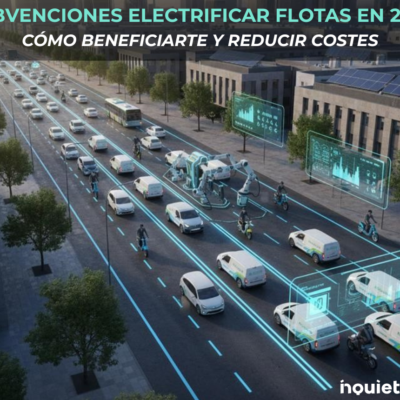The use of electric vehicles in large industrial facilities, such as factories or distribution centres, has already generated a major transformation in internal transport.
These environments, where logistics and the movement of materials are crucial, are finding EVs to be an ideal solution for optimising their operations. Efficiency, sustainability and cost reduction are just some of the benefits that these vehicles are bringing to the industrial sector.
Operating efficiency and performance
First and foremost, operating efficiency is one of the highlights of the use of electric vehicles in industrial facilities. Unlike vehicles with internal combustion engines, EVs offer a consistent and predictable performance, crucial for operations that require precise, synchronised movements.
EVs’ ability to start and stop quickly without any loss in power enables speedier, safer handling in environments where precision is key. What’s more, these vehicles are usually more compact and manoeuvrable, making it easier to operate in small, congested spaces which are common in factories and distribution centres.
Low maintenance and operating costs
Another important aspect is the cutting of operating and maintenance costs. Electric vehicles have fewer moving parts compared to internal combustion vehicles, which means they require less maintenance and are less prone to mechanical failures.
This results in a significant reduction in the expenses associated with repairs and spare parts, in addition to minimising maintenance downtime. In an industrial environment where time is a valuable resource, the reliability and reduced maintenance requirements of EVs result in greater operational availability and the optimised use of resources.
Reducing the carbon footprint in factories
What’s more, electric vehicles are contributing to the improvement in sustainability and reduction in emissions at industrial facilities. Factories and distribution centres, which have traditionally been major emitters of polluting gases due to the use of heavy machinery, are seeing a reduction in their carbon footprint thanks to the incorporation of EVs.
By eliminating direct emissions from combustion engines, EVs help improve air quality in closed spaces and reduce the overall environmental impact of industrial operations. This change is not only beneficial for the environment, but it also improves working conditions by providing a cleaner and healthier environment for employees.
Ability to adapt in complex environments
The versatility and adaptability of electric vehicles is also a key factor in their increasing at large facilities. EVs can be used for a wide range of tasks, from the transportation of materials and products at the plant to the movement of staff.
Some EV models are specifically designed for industrial tasks, offering the power required to handle heavy loads without the drawbacks of combustion engines. This versatility allows companies to optimise their fleet of vehicles and adapt their operations to changing market needs.
Automation of internal transport
Finally, the integration of smart technologies and automation in electric vehicles is taking internal transport efficiency to a new level. Many industrial EVs are fitted with automated control systems that allow for autonomous or semi-autonomous operation. This not only reduces the need for human intervention, but it also improves the precision and safety of operations.
For example, electric automated guided vehicles (AGVs) can follow predefined routes within a facility, transporting materials continuously and efficiently without the need for a driver. This automation, combined with the energy efficiency of EVs, is revolutionising internal logistics at factories and distribution centres.
In conclusion, the incorporation of electric vehicles at large industrial facilities is transforming the way internal transport operations are managed. Efficiency, cost cutting, sustainability and the ability to integrate advanced technologies make EVs an increasingly attractive option for factories and distribution centres which are looking to optimise their operations and remain competitive on a global marketplace.




